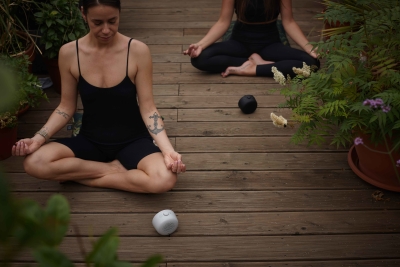
Little cards with huge impact
Mindfulness is a mind exercise, intended not only for people experiencing difficulties coping with stress and negative emotions. It allows us to recognize certain emotions and identify our inner strengths.
Living in an age of information overload, humans are constantly exposed to many distractions. Internet addiction, social media addiction, lack of concentration, insomnia. These are some of the major problems of our time. At the same time, an increasing inability to relax is observed among the population. Particularly in these challenging times, when working overtime, even on weekends has become the norm. Overworked people become more prone to stress and experience constant anxiety, which, when left unresolved may lead to serious psychological side effects.
However, this trend is slowly and gradually evolving. Gradually, the importance of regaining calm and clarity, while disconnecting from digital technology are gaining importance. One method of achieving peace is through mindfulness. It is becoming an increasingly popular method of exercise for the body and soul.
Mindfulness, according to the best-known definition by Jon Kabat-Zinn (creator of the Stress Reduction Clinic and the Center for Mindfulness in Medicine, Health Care, and Society at the University of Massachusetts Medical School), is a state of consciousness that is the result of an intentional and non-judgmental focus on what we experience in present moment. The stress reduction program created by Kabat-Zinn, mindfulness-based stress reduction (MBSR), is offered by medical centers, hospitals, and health maintenance organizations. MBSR uses a combination of mindfulness meditation, body awareness, yoga and exploration of patterns of behaviour, thinking, feeling and action. [1][2]
Mindfulness training refers to various meditation techniques, but it is closest to Buddhism.
In other words, mindfulness is a deliberate (that is, conscious) directing of your attention to what you are experiencing at the moment - here and now (not looking ahead, not going back to the past). A person experiences something at a given moment, but does not think what it means, but only calms the emotions and puts the mind "aside" so that he can focus on the experience of the present moment. This way he can receive and perceive the information reaching him clearly, without an emotional reaction, not through a filter of pre-formed views.
In their life, a person is often stuck in the past, focused on what has passed, pondering unfavorable events of bygone days, or looking into the future worrying what might be. Due to this preoccupation, they completely forget about the present. Additionally, the internal emotional balance is disturbed, thus - the development of anxiety and even depressive disorders. To prevent this from happening, we need to deliberately bring our awareness to the present moment.
However, the truth is that it’s not always easy to sit still with your eyes closed and focus on your breathing. It sounds perfect in theory. However, sometimes getting in touch with yourself can seem overwhelming and downright unattainable. The road to being in touch with yourself, understanding your needs and accepting yourself and your environment is long and not always straightforward. Achieving this state is often associated with many years of therapy.
Nowadays, mindfulness training is more and more often treated as a way to reduce stress and take care of your mental health by relaxing, connecting to your own emotions and getting to know yourself better. The goal of mindfulness training is to reduce stress and mental tension by focusing attention on the current experience and analyzing that experience.
Over time, the daily practice of mindfulness has gained popularity, also among meditators. Through meditation exercises. in which we focus on our breathing, we learn to notice the thoughts as they arise, but not to focus on them. Contrary to misguided beliefs, this technique is not about sitting and not thinking about anything.
Many people, at the beginning of their adventure with meditation, unnecessarily "tense up" trying to achieve this state. Meanwhile, the idea of mindfulness presupposes being in the present, meaning, capturing thoughts, recognizing emotions or influences on the body, and then allowing them to flow further.
The foundation of Mudita's philosophy is to visualize that joy comes from “living here and now”, which was captured in the slogan “Enjoy life. Offline." Excessive use of technology has been proven to have a negative impact on both overall health and mental well-being. For these reasons, Mudita encourages frequent disconnection from technology. Especially during these challenging times, where the line between remote work and personal life is often blurred. More than ever, we feel overwhelmed by the onslaught of information. We are more dependent on our smartphones because of the need to stay busy. This compulsion can only lead to increasing mental health problems. Mudita is a pioneer to the increasingly popular trend of saying no to a lifestyle dominated by glowing screens. It educates everyone interested in saying "yes" to freedom and having the to time to live offline with all its beauty of colors, scents, textures, relationships and emotions.
Noel Jones, a famous economics professor whom Michael, the founder of Mudita, met on the plane from Burma to Thailand, shares this view. During this unexpected meeting, he said:
“These days people limit their perceptions to 5 inch smartphone screens. What a waste of all the beauty and amazing things which surround us in real life! That is why I always dedicate first minutes of my lectures to new students to explain that they should observe and be present in the world around them with eyes wide open, and not limit their lives to those tiny screens, which is so often the case those days.”
The Mudita known for its work on the minimalist Mudita Pure phone, in the spirit of the philosophy of mindful and balanced living with technology, also meets the market needs. Mudita is the creator of minimalist cards for mindfulness training.
Mudita Pause cards are beautifully illustrated cards containing a collection of meditation and reflection on inspiring topics. They are designed to create a moment of tranquill awareness and deep concentration in a world full of distraction and overstimulation.
The name Mudita Pause refers to a moment of silence during a busy day. ‘Pause’ sounds soothing and is itself a reminder to slow down and enjoy the moment of mindful presence.
The deck contains 22 cards with mindfulness exercises, an additional set of 5 cards for writing thoughts that appear during meditation, and 2 cards with instructions. The cards are based on the observation and visualization of the natural world and its phenomena. They show the interrelationships between people and nature.
Picture of Mudita Pause
The purpose of Mudita Pause cards is to reacquaint the user to the nature around them, which they do not notice on a daily basis. The cards encourage us to look at nature in our immediate surroundings, while stimulating the curiosity about the world around us, which in turn allows us to appreciate it and enjoy it more.
Meditation cards are a fairly simple way to establish your focus, redirect your thoughts, and find a mantra which will help you start your meditation practice. There are many decks of meditation cards. The Mudita Pause cards, however, are unique and one of a kind.
Why mindfulness cards?
There are quite a few reasons why Mudita Pause cards are used to illustrate the words of wisdom which come to your mind and reconnect us to nature and the present moment:
1. A mindful moment of full attention. By looking at surroundings with genuine attention you can incorporate mindfulness exercises in your everyday life. This guided exercise helps to inspire compassion towards the natural environment and other living creatures. It shows how humanity is irrevocably intertwined with the trails of nature. As a result, it may foster a better understanding of your relationship with the world.
2. An interesting offline experience. With these cards, we wanted to provide people with a different way to spend quality time alone. We wanted to provide an alternative to typical offline activities such as reading a book or writing in a journal. The goal was to create a deep, meaningful, offline experience.
3. Focus on nature. In the world revolving around technology and glowing screens, we wanted to turn the attention towards the world of nature. The cards are based on the natural phenomena which are accessible to each person in the world, regardless of their status in society or the place they live in. It’s air - rain - soil - tree.
4. Intellectual and original meditation. The Deck’s meditation is unique and created at Mudita. Its originality comes from in-depth descriptions of our immediate surroundings, paired with imaginative and poetic language. The card’s narration is constructed in such a way that highlights the intimate connection of all living things, including humans.
The above-mentioned advantages of the cards are just some of the benefits which we may notice during meditation. By observing our surroundings with genuine attention, Mudita Pause guided exercises will help us to inspire compassion towards the natural environment and other living creatures. It will show how humanity is irrevocably intertwined with the trails of nature.
Each card has been designed with the utmost attention to detail - hand-drawn illustrations, friendly format, adequate thickness ensuring high product quality.
At the same time, the cards aren't meant to be visually distracting or catchy. Following Mudita's design principles, the deck design is soothing, neutral and warm. Its role is to guide users through the process of reading cards and enjoying the illustrations, rather than adding distractions with flashy graphics.
The back side of each card contains a balanced amount of written text to provide both stimulation and a moment of reflection.
Notice the high-quality card stock. It’s Munken Lynx, a high-quality uncoated paper with an impressive portfolio. This paper is made with attention to detail, with a passion for quality, tactile sensitivity and sensory sensitivity of the final product.
Created in Munkedal, a village in western Sweden, Munken is created with the environment in mind. It is 100% woodfree and eco-friendly.
Sometimes one mantra is enough to completely change your attitude for the day or to calm your nerves. If meditation is still not something we have time for, then it is worth starting your adventure with Mudita Pause Meditation Cards, which contain brief affirmations on each card.
Just pull out the card and focus on the positive message. Wherever you are, whether on the plane or at work. However don't just read it and put the card back in the deck. Keep the card with you, repeat the affirmation throughout the day, and as soon as you find a few minutes, meditate, write, or sketch on it.
Related stories

The Connection Between Self-Care and Mental Health
Tending to your own needs isn't selfish—it's the foundation upon which you can build a life of strength, resilience, and true fulfillment.

8 Pillars of Mental Fitness
Discover the 8 pillars of mental fitness. Learn how they can transform your life for a more holistic well-being.

Sleep-Friendly Holiday Gift Ideas for Everyone on Your List
This holiday season, delight your loved ones with Mudita's unique sleep-friendly gift ideas, perfect for anyone valuing restful nights and peaceful mornings.
If you'd like to receive the best stories from our blog, keep up to date with our progress and get notified about our product releases and special discounts.